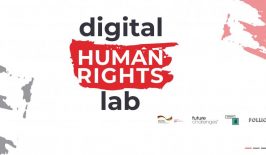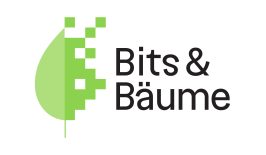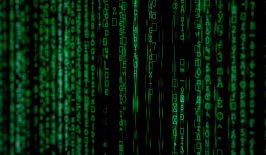The picture is clear: The energy consumption and CO2 emissions of the digital economy are rising continuously. Today, the production and use of digital devices and services already accounts for 8 to 10 percent of global electricity demand – and various scenarios predict a further usage-related increase of 50 to 80 percent by 2030. It doesn’t help that many of the big players among the tech companies, such as Alphabet (Google), Amazon, Apple, Meta (Facebook) and Microsoft, have set their own climate targets, because these all turn out to be inadequate on closer inspection.
What is needed, therefore, is a fundamental realignment of the digital economy, note the authors of the report “Digital Reset,” published just in time for this year’s “Bits & Bäume” conference on “Digitisation and Sustainability” from Sept. 30 to Oct. 2. “There are many useful digital technologies in niches. But by and large, the current form of digitisation is contributing to increasing socioeconomic inequalities and negative environmental effects outweighing the benefits,” said Dr. Steffen Lange of TU Berlin, one of the report’s lead authors.
The report is the result of a two-year research dialogue between 15 renowned experts from across Europe, including Lina Dencik (Cardiff University), Tomas Diez (Fab Lab Barcelona), Hugues Ferreboeuf (The Shift Project), Stephanie Hankey (Harvard University, Tactical Tech), Angelika Hilbeck (ETH Zurich), Mattias Höjer (KTH Stockholm) and Marianne Ryghaug (Norwegian University of Science and Technology), who have joined forces to form the expert panel “Digitalization for Sustainability” (D4S). The project is based at TU Berlin and the Einstein Center Digital Future and is funded by the Robert Bosch Foundation. The report is based on literature and meta-analyses of current research and, in particular, on an interdisciplinary dialog.
If the digital economy continues as before, the Paris climate goals will remain unattainable
“None of the big tech companies are on a development path that is compatible with the 1.5-degree Paris target. Our analysis shows that Alphabet and Meta’s energy consumption has roughly tripled in the last five years, linear to their revenues – despite massive efficiency improvements in their huge data centres,” reports Prof. Dr. Tilman Santarius of TU Berlin and the Einstein Center Digital Future, who also contributed to the report. So the great environmental hopes that digitisation could increase energy efficiency and digital services could replace physical products do not match the current reality. This has mainly to do with the fact that the savings potential of digitisation is eaten up primarily by the more intensive use of digital technologies, according to Santarius.
A sustainable digital economy is possible – three building blocks
A first essential step to massively reduce CO2 emissions from the digital economy is to reduce the environmental footprint and social costs of manufacturing and operating digital devices, data centres and infrastructures. This is not just about increasing efficiency, but incorporating sufficiency as a guiding principle and introducing a circular economy, according to the report’s authors. They say, not only using “less” (efficiency), but also “enough” (sufficiency) and the longest possible lifespan of products and resources (circular economy) are crucial to achieving the 1.5-degree target, they say.
The second important building block, according to the scientists, is that the business models of major tech companies urgently need to be aligned with the common good. “In our report, we show how tightening monopoly law, consistently enforcing social, ecological and economic standards, and at the same time promoting alternative business models can initiate a change in direction,” Lange reports. It is clear that this is not an easy task, because here politics must intervene in the core business of the most powerful companies worldwide – but according to the authors, it is indispensable.
As a third building block, the report calls for a public good-oriented use of digital data and artificial intelligence (AI) applications. This includes requiring developers of AI systems to report on energy consumption and emissions during the development and training phase. This is an important basis for ensuring that the applications actually achieve savings.
Digital technologies can transform economic sectors sustainably – if they are designed properly
The report also lays out very concrete policies, new institutions and alternative practices for how digital technologies can truly put all sectors of the economy – agriculture, mobility, industry, energy, housing and consumption – on a sustainable course. The main point here is to replace the digital policy narrative that the competitiveness of European companies must be strengthened and economic growth boosted. It is much more important “that the policy-making of all sectors – from agriculture to transport to industrial policy – systematically addresses the opportunities and risks of digital transformation,” Lange said.
In agriculture, for example, digital technologies could in the future support the shift toward locally adapted and ecological farming methods, instead of continuing to optimise the cultivation of environmentally harmful monocultures. Low-emission and diverse mobility can be achieved by policymakers responsibly releasing data and software. In industry, digital technologies could promote resilient and circular production if policymakers do not just continue to pursue a growth logic. In the energy sector, digital technologies could be increasingly used to support decentralised, renewable energy systems, and in the buildings sector, a different approach to data can ensure that demand for new buildings and the energy consumption of buildings fall.
The report shows the essential steps toward a society in which digital technologies contribute to climate neutrality, biodiversity, a resilient economy and social justice – and thus provides an important guide for the European Union. For there is considerable catching up to do here: even if the measures of the current “Green Deal” are first steps, a deeper socio-ecological transformation is needed for a truly sustainable society.
The report can be downloaded at the following link: Digital Reset – Redirecting Technologies for the deep sustainability transformation








